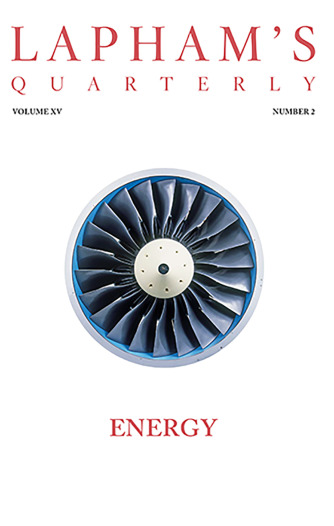What a strange chaos is this wide atmosphere we breathe! Every atom, impressed with good and with ill, retains at once the motions which philosophers and sages have imparted to it, mixed and combined in ten thousand ways with all that is worthless and base.
The air itself is one vast library, on whose pages are forever written all that man has ever said or woman whispered. There in their mutable but unerring characters, mixed with the earliest as well as with the latest sighs of mortality, stand forever recorded, vows unredeemed, promises unfulfilled, perpetuating in the united movements of each particle, the testimony of man’s changeful will.
But if the air we breathe is the never-failing historian of the sentiments we have uttered, earth, air, and ocean are the eternal witnesses of the acts we have done. The same principle of the equality of action and reaction applies to them: whatever movement is communicated to any of their particles is transmitted to all around it, the share of each being diminished by their number, and depending jointly on the number and position of those acted upon by the original source of disturbance. The waves of air, although in many instances perceptible to the organs of hearing, are only rendered visible to the eye by peculiar contrivances; but those of water offer to the sense of sight the most beautiful illustration of transmitted motion. Everyone who has thrown a pebble into the still waters of a sheltered pool has seen the circles it has raised gradually expanding in size, and as uniformly diminishing in distinctness. He may have observed the reflection of those waves from the edges of the pool. He may have noticed also the perfect distinctness with which two, three, or more series of waves each pursues its own unimpeded course when diverging from two, three, or more centers of disturbance. He may have seen that in such cases the particles of water where the waves intersect each other partake of the movements due to each series.
No motion impressed by natural causes, or by human agency, is ever obliterated. The ripple on the ocean’s surface caused by a gentle breeze or the still water which marks the more immediate track of a ponderous vessel gliding with scarcely expanded sails over its bosom are equally indelible. The momentary waves raised by the passing breeze, apparently born but to die on the spot which saw their birth, leave behind them an endless progeny, which, reviving with diminished energy in other seas, visiting a thousand shores, reflected from each and perhaps again partially concentrated, will pursue their ceaseless course till ocean be itself annihilated. The track of every canoe, of every vessel which has yet disturbed the surface of the ocean, whether impelled by manual force or elemental power, remains forever registered in the future movement of all succeeding particles which may occupy its place. The furrow which it left is, indeed, instantly filled up by the closing waters; but they draw after them other and larger portions of the surrounding element, and these again once moved, communicate motion to others in endless succession.
The solid substance of the globe itself, whether we regard the minutest movement of the soft clay which receives its impression from the foot of animals or the concussion arising from the fall of mountains rent by earthquakes, equally communicates and retains, through all its countless atoms, their apportioned shares of the motions so impressed. While the atmosphere we breathe is the ever-living witness of the sentiments we have uttered, the waters, and the more solid materials of the globe, bear equally enduring testimony of the acts we have committed.
If the Almighty stamped on the brow of the earliest murderer the indelible and visible mark of his guilt, he has also established laws by which every succeeding criminal is not less irrevocably chained to the testimony of his crime; for every atom of his mortal frame, through whatever changes its severed particles may migrate, will still retain, adhering to it through every combination, some movement derived from that very muscular effort by which the crime itself was perpetrated.
The soul of the Negro whose fettered body, surviving the living charnel house of his infected prison, was thrown into the sea to lighten the ship, that his Christian master might escape the limited justice at length assigned by civilized man to crimes whose profit had long gilded their atrocity, will need, at the last great day of human account, no living witness of his earthly agony. When man and all his race shall have disappeared from the face of our planet, ask every particle of air still floating over the unpeopled earth, and it will record the cruel mandate of the tyrant. Interrogate every wave which breaks unimpeded on ten thousand desolate shores, and it will give evidence of the last gurgle of the waters which closed over the head of his dying victim; confront the murderer with every corporeal atom of his immolated slave, and in its still quivering movements, he will read the prophet’s denunciation of the prophet king.
From The Ninth Bridgewater Treatise. Confident that if humans could thoroughly comprehend the past, they would be able to calculate their future, Babbage in 1822 directed the construction of his first difference engine—a precursor to the earliest mechanical computers. “I undertook to superintend, for the government,” Babbage writes later in this treatise on natural theology, “the construction of an engine for calculating and printing mathematical and astronomical tables.” Work on a second engine began in 1847, but it remained uncompleted until 1991, when a version was built at London’s Science Museum.
Back to Issue





